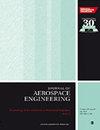Moment-independent sensitivity analysis of a fold mechanism based on an active learning kriging method
IF 1.1
4区 工程技术
Q3 ENGINEERING, AEROSPACE
Proceedings of the Institution of Mechanical Engineers Part G-Journal of Aerospace Engineering
Pub Date : 2024-03-28
DOI:10.1177/09544100231162735
引用次数: 0
Abstract
The present article shows the reliability and sensitivity of a missile folding rudder calculated by MSC.ADAMS and MATLAB. For folding rudder, mass of the counterweight, maximum of the motive force, preloading force, and stiffness coefficients of the spring 1 and spring 2 are considered when calculating the reliability. Two methods, active learning kriging (ALK) and Monte Carlo simulation (MCS), are introduced to calculate the reliability. The results obtained by ALK and MCS are compared to ensure the accuracy of the reliability. Three failure modes are considered respectively in reliability calculation, including the unfolding time exceeding the specified value, the max load of the lock structure 1 or lock structure 2 exceeding the specified value. Moment-independent sensitivity index is introduced to assess the importance rank of each factor. Both cases with and without gap are discussed to explore the influence of gaps between sleeve and shaft. Comparison of two cases show that gaps could reduce reliability of the folding rudder. The influence of gaps cannot be neglected during the reliability calculated, especially for mechanism with several motion joints like the rudder folding. The works aim to provide valuable guidance for design and optimization of unfolding rudder. In addition, it is a beneficial trial for introducing reliability theory in weapon equipment field.基于主动学习克里金法的折叠机制时刻敏感性分析
本文展示了用 MSC.ADAMS 和 MATLAB 计算的导弹折叠舵的可靠性和灵敏度。在计算折叠舵的可靠性时,考虑了配重的质量、动力的最大值、预紧力以及弹簧 1 和弹簧 2 的刚度系数。计算可靠性时引入了两种方法,即主动学习克里金法(ALK)和蒙特卡罗模拟法(MCS)。对 ALK 和 MCS 得出的结果进行比较,以确保可靠性的准确性。可靠性计算分别考虑了三种失效模式,包括展开时间超过规定值、锁结构 1 或锁结构 2 的最大载荷超过规定值。引入了与时刻无关的敏感性指数来评估各因素的重要性等级。讨论了有间隙和无间隙两种情况,以探讨轴套和轴之间间隙的影响。两种情况的比较表明,间隙会降低折叠舵的可靠性。在计算可靠性时,间隙的影响不容忽视,特别是对于像折叠舵这样有多个运动关节的机构。这些工作旨在为折叠舵的设计和优化提供有价值的指导。此外,这也是将可靠性理论引入武器装备领域的有益尝试。
本文章由计算机程序翻译,如有差异,请以英文原文为准。
求助全文
约1分钟内获得全文
求助全文
来源期刊

CiteScore
2.40
自引率
18.20%
发文量
212
审稿时长
5.7 months
期刊介绍:
The Journal of Aerospace Engineering is dedicated to the publication of high quality research in all branches of applied sciences and technology dealing with aircraft and spacecraft, and their support systems. "Our authorship is truly international and all efforts are made to ensure that each paper is presented in the best possible way and reaches a wide audience.
"The Editorial Board is composed of recognized experts representing the technical communities of fifteen countries. The Board Members work in close cooperation with the editors, reviewers, and authors to achieve a consistent standard of well written and presented papers."Professor Rodrigo Martinez-Val, Universidad Politécnica de Madrid, Spain
This journal is a member of the Committee on Publication Ethics (COPE).
 求助内容:
求助内容: 应助结果提醒方式:
应助结果提醒方式:


